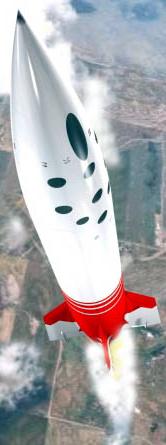Estes X-Prize Canadian Arrow
Estes - X-Prize Canadian Arrow {Kit} [2004-2008]
Contributed by John R. Brandon III
| Construction Rating: | starstarstarstarstar_border |
| Flight Rating: | starstarstarstarstar_border |
| Overall Rating: | starstarstarstarstar_border |
| Manufacturer: | Estes  |
 Brief:
Brief:
A single-staged, D motor powered sport scale representation of the Canadian
Arrow competitor for the Ansari X-Prize.
Construction:
The kit consists of a really big blow-molded nose cone and tail cone, two
sheets of laser cut balsa fins, motor mount tube, main airframe body tube,
motor retainer hook, motor block ring, sheet of die-cut cardboard centering
rings, 1/4" x 30" rubber shock cord, 3/16" launch lug, black
motor hook retainer ring, decal sheet, two blocks of clay nose weight, and
18" parachute. All parts were present and none were damaged.
It contains typical Estes instructions: well written and in a logical order. Laser-cut fins are a little harder to remove from the sheet than die-cuts have been. The plastic tail cone makes it pretty hard to misalign the fins on this one. One of the huge die-cut centering rings had a slit made in it which led me to use a different shock cord locking method. I fed the cord through the slit and tied it off below before gluing in the motor mount. I put in an old Centuri ejection baffle sized to fit 24mm Estes tube...otherwise this one's gonna need lots of wadding!
Fins needed some sanding to fit well. They look a little light in balsa, but the balsa is quite hard. They were assembled with my usual cornucopia of glues: CA, Elmer's gel school glue, Testor's Plastic Model Cement. There were no real assembly "gotchas".
Finishing:
This is the trickiest X-bird to paint so far of the three I've built and
reviewed. The paint masks provided were actually better used as templates to
mark lines to brush on the "maple leaf" motif on the aft airframe. I
did the basecoat in Miracal aerosol enamel from my local Dollar General Store,
then marked the maple leaf pattern with a sharp pencil and brushed on Testor's
Acrylic Gloss Red. I made a typing paper wraparound for the multiple girth
bands above the tail cone. I had to guess how wide they were, since the
painting directions didn't specify. It still looks pretty good, kind of like a
captured Canadian V-2!
 I still
wish Estes would go back to waterslide decals instead of stickers and a
wraparound for the multiple girth bands could be added.
I still
wish Estes would go back to waterslide decals instead of stickers and a
wraparound for the multiple girth bands could be added.
Construction Rating: 4 out of 5
Flight:
I flew it with D12-3s in all flights. I stuffed four squares of Estes paper
down the motor mount tube then laid another four squares on top under the
parachute. It flew straight as its namesake to just about 475 feet and ejected
right at apogee. Descent rate just about right for the size of the rocket.
Flight Rating: 4 out of 5
Summary:
Main PROs: Nice plastic parts, well designed, headline grabbing subject.
Main CONs: Paint scheme is a little tricky and not clearly explained for Joe Average Modeler's sake, needs better decals
Overall Rating: 4 out of 5
(picture above is simulated)
 |
 |
Flights
 |
 |
R.D. (May 25, 2008)
Sponsored Ads
 |
 |












J.S.P. (January 20, 2006)